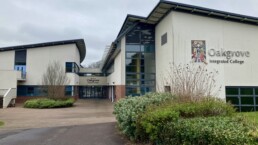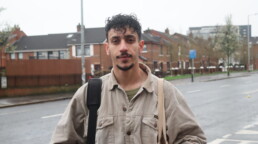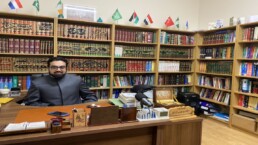Series: The Rise of Integrated Schooling in Northern Ireland
LONDONDERRY — Several of our reporters covered how education was being impacted as Northern Ireland has continued to heal from its past and how an integrated school in Londonderry has led the charge in bridging religious and cultural divides.
Read their stories at the links below:
Building Bridges: Integrated School Links Religiously Divided Londonderry by Katelin Moody
‘It’s Not Something We Discuss,’ the Changing Role of Religion For Northern Ireland’s Schoolchildren by Ellie Davis
Integrated Education in Northern Ireland: An Attempt at Repairing Religious Divide by Emma Paidra
A 17-year-old Path from Immigrant Youth to Belfast Council Advocate
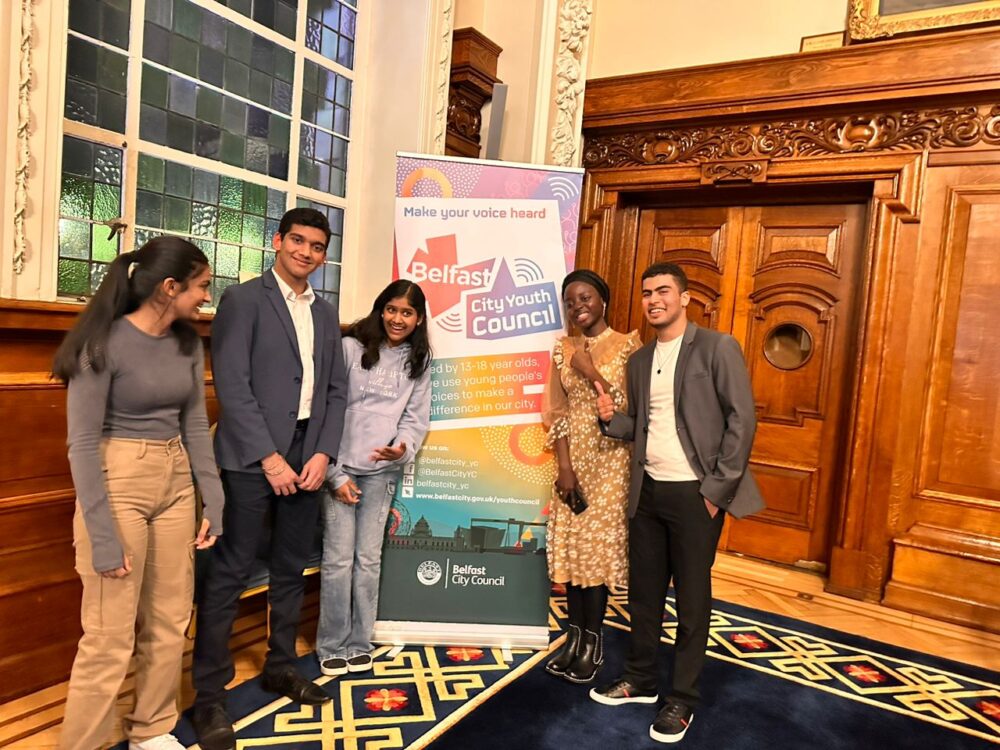
BELFAST -- Inioluwa Olaosebikan, a 17-year-old immigrant from Nigeria, sits on the Belfast City Council where she advises the city on diversity and education for young people. She is one of the 25 young people from communities across Belfast shaping the council's agenda. She also teaches young children coding and other computer and life skills.
However, because of a quirk in the UK education law that provides for free education only until 16 years of age, she is unable to go to school or get loans to go to school.
Inioluwa, known to her friends as Ini, has written over 100 school applications, only to be met with rejections or silence. A lot of schools said that she came a few weeks too late to enroll.
When she arrived in Belfast in October 2023, she had different expectations. While her younger sister was able to enroll in a local high school, she was barred. And if she can’t finish high school she can’t pursue her dream of continuing her education in a university.
"When I got here, I found out very quickly that it would be very difficult for me to access education," she said.
Ini’s case shows the challenges faced by immigrant youth in Belfast, where access to education can be hindered by bureaucratic and financial obstacles. Despite her determination to learn, her dependent status on his mother's student visa made her ineligible for public funds, including student loans.
"You can't take out a loan or anything like that," she said. "You know, being in this type of space, especially international fees are actually very expensive. “You're out of your own pocket."
"They just deny you. They don't provide you with any alternatives," she said.
She discovered that the Education Council of Northern Ireland holds no statutory duty to educate young people beyond the age of 16, leaving her without official avenues for support. In the United Kingdom, the typical school system spans from ages 5 to 16, ending with students sitting their General Certificate of Secondary Education exams. After that, students have the option to pursue further education for an additional two years, known as the A-level years, either at a sixth form college or further education college.
Ini aims to complete her A-levels, and go to a university to study a dual degree in computer science and politics or social work as an undergraduate.
“Education is a thing for us,” she said. “My family, we pride in education too much.”
Religious-Based Education
Integrated schools in Northern Ireland adhere to a strict quota system in integrated schools, allocating 40% of places to individuals identifying as Catholic, 40% to those identifying as Protestant, and the remaining 20% to those classified as "others." This division comes from the Troubles, an ethno-nationalist conflict that enhanced segregation between Catholics and Protestants and lasted for about 30 years from the 1960s to 1998.
Ini believes that if she had been classified as Protestant, her entry into schools would have been easier. However, the educational system branded as an “other” making her compete with other immigrants for a limited amount of “other” spots. There is some irony here since she is technically Protestant – she attends the Nigerian Protestant Church in Belfast and found herself categorized as "other" when trying to enroll in school. In the eyes of the government, however, she is other.
"You might be Protestant, but as long as you're black, you definitely do fall under the 'other' category," she said.
This classification is not solely based on religious affiliation but also on racial and cultural factors. "It's white Catholics, white Protestants," she notes. "If you don't fall under that category, then you're 'others.'"
The implications of this categorization extend beyond school enrollment. Funding for youth organizations serving the "other" category is also impacted, as resources are distributed according to the same 40-40-20 ratio. Consequently, organizations catering to marginalized communities, including those comprised of individuals of diverse ethnicities and religions, face challenges in securing adequate funding and support.
Finding Her Path
Ini’s only option was to wait to enroll in school the following year. The prospect of waiting another year for educational opportunities weighs heavily – she discovered a passion for volunteering that has transformed her life. She sought opportunities to contribute to her new community and found solace in volunteering at a youth organization in Belfast known as Diverse Youth NI.
"Volunteering has been the highlight of my entire journey so far," she shares. "Just being here alone has opened so many doors for me with opportunities."
The idea to volunteer came from Ini’s aunt who believed it would be a valuable use of her time as a young person in a new country. Through her involvement with Diverse Youth in Northern Ireland, she has not only gained valuable experiences but has also undergone personal growth.
"I had to learn on my feet," she says. "I learned a lot about communication, public speaking, and a lot of empowerment along the way."
Ini's role involves working closely with younger children, teaching them skills such as coding and facilitating sessions on mental health. Diverse Youth NI serves a diverse range of individuals, particularly those from Black, Asian, and minority ethnic backgrounds in Northern Ireland, including asylum seekers, refugees, and immigrants like her. Through her work, she not only contributes to the community but also advocates for the empowerment and inclusion of marginalized groups.
"I work with youth, empower them," she explains. "I do a lot of mentorship with young people."
In Northern Ireland, accessing education can be a formidable challenge for immigrants, but efforts are underway to address these barriers. Ini's organization is at the forefront of this endeavor, providing crucial educational opportunities for immigrant communities.
"We do a lot of digital literacy courses," she explains. "During the time they can’t access school, we empower them with access to English classes."
Beyond language barriers, Ini advocates for systemic change to improve educational access for immigrants. She did a full presentation to the Committee of Education in Northern Ireland on youth education and engagement as well as wrote a seven-page paper with recommendations for policy change focusing on the critical challenges and barriers faced by BAME (Black, Asian, and Minority Ethnic), asylum-seeker, and refugee youth within the educational and employment sectors in Northern Ireland, especially in the wake of digital era advancements.
"I submitted a list of recommendations for policies that we can put into place to help people access education," she said. Education, she believes, is fundamental to empowerment, especially for vulnerable young people navigating life in a new country.
"If you're ignorant, you will not know a lot of things, and you won't have a lot of opportunities," she said.
This drive to effect change led her to a significant role – serving on the Belfast City Council in the Belfast City Youth Council from 2024 to 2026. Her position allows her to directly influence policy decisions and advocate for the needs of marginalized communities. With her experience in a leadership and politics program through Diverse Youth NI, she felt encouraged to apply for the position.
It's a role that aligns with her longstanding passion for creating more opportunities and empowering those around her.
Finding Community
While serving on the Belfast City Council provides her with a platform to advocate for underrepresented voices, Ini acknowledges the historical exclusion of minority ethnic communities from decision-making spaces.
"A lot of their policies, a lot of their laws cater to their own community, which is the Protestant and the Catholic community," she observes. "Oftentimes, in that space, they leave out the voices
of minority ethnic people. They actually reached out to us and said, 'Okay, we need to hear diverse voices,'" she said.
While this outreach is a step in the right direction, Ini recognizes the persistent challenges of representation and belonging for minority ethnic youth.
"In a society where it's divided, segregated, you can never feel like you belong," she said. “When you come to a new place, you don't really feel like you belong, I still don't feel like I belong. The only place I feel like I belong is in the place where there's a lot of representation, I see myself in other people, I see people that look like me.”
For many immigrants like Inioluwa, volunteering serves as more than just a way to give back – it's a lifeline for integration into Belfast's community.
"Volunteering has actually been the only way I've been able to communicate, to integrate into Belfast," she shares. "It's very difficult making friends when you don't really know anybody, you don't know where to go to make friends. If not for volunteering, I probably wouldn't know any of the people I know today."
For Inioluwa, connecting with other Nigerians through volunteering has been particularly impactful. In addition to volunteering, Inioluwa finds solace and community in her faith. She goes to the Christian Church of God in Nigeria, and they have a center in Belfast. Attending church not only provides her with spiritual nourishment but also offers opportunities to connect with fellow Nigerians and young people in the community. There are other Nigerians who came into Belfast and she was able to connect with the same issues.
“That makes me feel like I belong in this space,” she said. “I feel seen, I feel heard. I feel loved, I feel accepted. It is definitely very important.”
The Unanswered Questions: Why Three Former Irish Catholics Converted
DUBLIN - For the last several decades, the Catholic Church of Ireland has been losing its followers at a rapid pace. Historically, the percentage of Catholics in Ireland has been among one of the highest of European countries. But between 2006 and 2022 the percentage of the Irish population that self-identifies as Catholic dropped from 90% to 69%, Census data showed. Most people who casted off their Catholic identity shifted away from religion as a whole, experts say. But where did those who didn’t want to lose their faith go?
On a recent trip to Ireland I tried to find the answer to this question. Among former Catholics I met were a Protestant leader, a pagan practitioner and a Muslim woman.
Despite having such starkly different backgrounds and religions, the three struggled with an inner conflict around their Catholic identity.
The struggle around Catholic identity has become more common in Ireland, especially after the church’s sexual abuse scandals became public, according to Hugh Turpin, an anthropologist and cognitive scientist and the author of a book about the religious decline of the Catholic church in Ireland. Turpin added that after the abuse, the public opinion on the church shifted, and more people began to oppose the institutionalized influence of the Catholic Church on issues such as abortion and same sex marriage. Turpin called these “moments of awakening”: when people casted off their Catholic identity. “They don't want to be associated with [the Catholic Church] anymore,” he said.
For the people I spoke to, their moments of awakening were driven by questions that they felt could not be answered by the Catholic Church, inspiring them to go on a spiritual quest to find their answers. These are the stories they told me.
From Catholicism to Islam
For Lorraine O’Connor shifting away from Catholicism came when she couldn’t find the answers to the questions she was looking for. She converted to Islam in 2005.
O’Connor is now 57 years old. She is the founder and director of Muslims Sisters of Eire, an organization committed to helping those in need and promoting inclusion, diversity and women’s empowerment. When she is not developing religious education programs, participating in interfaith discussions or running the soup kitchen, she works from her office in South-West Dublin.
O’Connor has the kind of face that reveals the toll her work is taking on her: a vertical wrinkle deepens as she frowns and she has bags under her blue eyes. She wears a taupe pink hijab that covers her hair, and contrasts her black jeans and boots.
Born in a Catholic, patriotic Irish family O’Connor grew up with a strong Catholic ethos. Her parents taught her early on about spiritualism: that there is someone to pray to, and “to fear the wrong and do the right.” “My mother used to be able to say to do good, you will have a blessing in this life or even the next life,” O’Connor recalled. “But to do bad, you need to be repentful.”
Praying and going to mass were central aspects of her life. In her late teens and early twenties, O’Connor said she attended conferences and went to mass almost every single night. “Except when I was at a club,” she said. “I’m not saying I wasn’t a little rebel.” At the same time, the spirituality she had been taught was omnipresent. “There was always a connection of knowing that there’s something else there,” O’Connor said. “So ‘What is there?’ was my question.”
As O’Connor grew older, she gradually became dissatisfied with the answers Catholicism gave to this question. “Am I praying to Jesus? Am I praying to God? Am I praying to the spirit?” she said she thought. O’Connor was confused by all the different versions of the Bible; by that you had to go to a priest to forgive you for your sins; by that priests couldn’t get married or have children; by that you had to be seven years old and wear a white dress for communion as a girl. And then there were the sexual abuse scandals of the Catholic Church. “There were just too many unanswered questions for me,” she said.
In 1987, O’Connor met a man from Libya. “I was infatuated,” she said. “With the whole other being, the other person, the other language, the other color, the other religion: the other.” She fell in love and married him. That was the first time she ever heard about Islam other than what she would have seen growing up in the 80s. “To me, Islam connected with terrorism, because that's what you see in the media.”
When they had four daughters together, she wanted to provide them with some religious education. As she was no longer practicing Catholicism actively and given her husband’s faith, she decided to introduce them to Islam. “So I studied a little bit about it, to be able to give them, my daughters, some kind of backbone,” she said. But she wasn’t convinced just yet.
In 2004, her marriage broke down and she got a divorce. “And then I was, like, at a kind of part of my life where it was dark,” she said. “I didn't know which way to go. And I had four children. I was on my own.” She said that one night she found herself crying, and started reading the Quran. “And it was like, this is it,” she said. “And so I divorced a Muslim, and then I became a Muslim,” O’Connor said laughing. “It had to be for me, not for a man.”
O’Connor said that in Islam she found her answers. “When I started looking really deeply into it, I was like, oh my God, this religion is absolutely beautiful,” she said. “You just want to pray, you want to have that connection with God.”
In comparison to the Bible, she added, the Quran has never been changed. The text is still the original text from over 1,400 years ago. “It's about recognizing you know yourself and trying to discipline yourself to do good when in your life,” she said. “The biggest thing is don't judge other people.”
Most of the time O’Connor’s organization receives positive reactions, but at times she faces difficulty running a Muslim women's organization. Sometimes their Facebook posts get anti-Muslim reactions. Especially after Hamas attacked Israel on October 7, and the following war, O’Connor said tensions have increased. On a personal level, she has had similar experiences: she rarely speaks to her brothers, who aren’t practicing Catholics anymore, but did not approve of her choice to convert to Islam. She occasionally speaks to her sister, who still practices Christianity. Nevertheless, O’Connor never lost her ties to her Irish identity and her family history. She tries to transcend that attitude to her four daughters, who are all Muslim. “I want them to be very proud of their identity,” she said. “Yeah, you’re Muslim, but you’re also Irish.”
For O’Connor, Islam brought her to an end of the journey of what she was looking for. She said it has brought her completion, stability and a new purpose in life. “I'm very blessed,” she said. As the founder and director of Muslim Sisters of Eire she now tries to educate Irish people about Islam, and facilitates interfaith discussions. “Everything I do is for my religion,” she said. “I work to create a better understanding in the beauty of the real Islam.”
From Catholicism to Protestantism
For Dermot Dunne the conversion to a different religion also came at a later time in life. Dunne is the Dean of Christ Church Cathedral in Dublin. He is now 65. Dunne has gray short hair and a trimmed beard. His friendly blue eyes are covered by a pair of black glasses. At the top of his black shirt a part of his white collar is visible. Despite being raised Catholic — and being ordained as a Catholic priest — Dunne converted to Protestantism in his 30s.
Born in 1959, Dunne grew up in Southern Ireland in a family of eight. His family attended church every Sunday, but wasn’t very religious in its traditions. In the 70s, when Dunne grew up, about 93.9% of the Irish population identified as Roman Catholic, according to Census data. When he was about 7 years old, Dunne started helping out his family by looking after his aunt, who was handicapped, and very religious. “One of her favorite occupations was going to church,” he said. “I think after that I was influenced by it.”
Dunne said he was attracted to the spirituality of the rituals. “It drew me deeper into trying to understand who God is,’ he said. “And a search began to find within myself that depth of spirituality.”
He became an altar boy, went to church school and in secondary school, he decided that he wanted to follow the path of the church. Dunne was ordained a priest in 1984, when he was 25. It opened up a whole different world of how to approach religion, Dunne said. During seminary he was taught to recognize that everyone has an individual faith and spirituality. “That is what has been the guiding principle of my life ever since, that questioning and the quest for deepening spirituality,” he said.
Dunne started as a priest at the Roman Catholic Diocese of Cloyne, a rural parish, and a very devoted community. The community came to church every Sunday. For the first time he started hearing confessions of people. “In the confession box, I learned a lot about people's lives and their faith,” Dunne said. “And how religion tended to be in millstone around the neck.” Dunne learned that especially sexuality was a huge issue for many: the issue of the Catholic Church and contraception, abortion and the general position of women in the church. Soon he became disillusioned. “I started questioning the whole position of human sexuality within the church,” Dunne said. “The church wasn’t developing in a way that I thought it should be.”
Although Dunne enjoyed the preaching and executing the rituals, he became uneasy with being a priest. An inner conflict unraveled. “The agenda of being a priest was that you held the teachings of the church,” he said. “And I was having big doubts about the teaching at the church at the time.” For Dunne it was impossible to live a double life in which he pretended to believe something which he didn’t, he said.
He got an opportunity to become a chaplain in the Whittington Hospital in London, and served two parishes, St. George’s Cathedral and St. Mary’s Church. In London, Dunne connected with different faiths: Hinduism, Islam, Buddhism and the Church of England. He shifted away from Catholicism further. “I began to understand my own spirituality as developing and going along the lines with anglicism,” he said. “Which doesn’t have the static dogma, but always interprets the Bible through experience.”
Dunne left the active Catholic ministry, started working in an office job and began training as a psychotherapist. He felt that his journey, transitioning directly from school to seminary and then to parish as a priest, combined with his inner conflict, had left him emotionally stunted. “[I] needed an avenue to explore my own emotional life,” Dunne said. “That provided the balance and the grounding for developing my own spirituality.”
In his four years outside the ministry, working in a secular job, there were moments that Dunne felt that if he left Catholicism, God wouldn't love him anymore. But gradually his relationship with God started to change. It became about the person he was, not what he chose in life. “That's what caused me to move beyond where I was,” Dunne said.
Dunne, who had been a celibate as Catholic priest, married a woman and moved back to Ireland. Still, his quest to serve in ministry remained strong. He approached the Archbishop of the Church of Ireland. “All this time I was feeling that ministry was really what I wanted,” Dunne said. “We had a long conversation and he said to me ‘there’s nothing barring you from coming into the Anglican Church or being an Anglican priest.” Neither his family nor his siblings had any problem with him converting. Dunne was accepted into the church. He started as an assistant to the dean of the Christ Church Cathedral in Dublin, served Parishes in the Diocese of Ferns, to eventually return to Dublin and become the dean of Christ Church Cathedral himself in 2008.
“I look back and think it’s the best decision I made in my life, apart from getting married,” Dunne said. “It was what I needed to do.”
Dunne said his journey has changed his approach to faith. “The cathedral offers me this opportunity to meet people of all faiths and none, and accept them for who they are,” Dunne said. “We are all on a spiritual journey, in trying to make out what the world is about.”
Dunne said that he wants to help people with developing their own language of spirituality. “The way I see my job. It’s not promoting a particular religion or a particular faith,” Dunne said. “It is to empower people to seek their own spirituality.”
From Catholicism to Paganism
Luke Eastwood started shifting away from Catholicism earlier than O’Connor and Dunne. Eastwood has blonde eyebrows, blue eyes and thin lips. He is almost bald and wears one ear knob in his left ear. In the back of his office hangs a guitar next to staples of books. Eastwood, who is now 54, grew up in Scotland with a Protestant mother and a Catholic father. His father wasn’t very religious, but when Eastwood was 11, and his father divorced his mother and married a Catholic woman, things started to change.
“I went to Catholic school and started going to mass,” Eastwood said. He became increasingly interested in religion and became an altar boy in school. He started questioning his father on the meaning of life, the reasons to exist and how the universe got here, but wasn’t satisfied with the answers his father gave him. He couldn’t answer the questions Eastwood was asking. “What's the point of being alive if none of it matters at all, you know?,” he said. “So I just thought, no, this can't be the answer.”
In his teenage years, Eastwood started being frustrated about the church’s answers to the questions as well. “The priest consults a book they got from the Catholic Church that tells the answers to give you about all these problems,” he said. “I don't think life is that simple.” In addition, Eastwood questioned the role the church had on sexuality. “You know you can't do anything. You mustn't touch yourself. You mustn't have sex. You mustn't do anything, blah blah blah,” Eastwood said. “You have to wait for everything till you get married.”
When Eastwood was 16, his uncle gave him a book about Buddhism and showed him how to meditate. Eastwood recalls himself sitting in his room, meditating with a candle when his stepmom walked in. She gave the books back to his uncle, but Eastwood was already shifting away.
When he went to university, Eastwood tried out other religions. “So I thought, well, okay, I don’t want to be Catholic anymore, but what do I want to be?” Eastwood went to classes from Indian priests about Hinduism, studied Jewish mysticism, Islam, and Daoism. “All these things had elements of them which were very appealing. And some of them had elements that weren’t very appealing,” Eastwood said. “I wanted something that wasn’t full of, like, ridiculous rules.”
Eastwood moved to London, started being involved in the Greenpeace environmental organization and learned more about Paganism. “From a religious point of view it really worked in the mysticism around nature,” Eastwood said. “I think if I hadn't done that, I think I would have become a Buddhist.” But he said being from this part of the world, he felt that Paganism fitted him better.
To Eastwood the Pagan understanding of gods as being benevolent and capricious at the same time, in opposition to Catholicism, which sees God as all good and evil as the work of the devil, was appealing. “The reality of it is a lot more complex,” Eastwood said. “I’m much into what you call Gnosticism,” he added. “Where you have a direct relationship with whatever you think God is.” In other religions, he said, there is someone in between. “There is a priest who's telling you what to think, what to say, what to do, how to do it, when to do it,” Eastwood said. “Who's to say I can't just decide how I want to interact with whatever God is?”
Eastwood married a woman who had also converted from Catholicism to Paganism. Her parents were devoted Catholics, and opposed Paganism – Eastwood and his wife got married in church. They got a daughter together, who was raised “nominally Catholic” because of her grandparents, and moved to Ireland. Eventually, their marriage did not hold.
Eastwood executes his religion through daily prayers, invocations and meditations. During larger moments such as the lunar cycle, the full moon celebration or equinoxes he tries to make a moment of it. For him the most important thing is to try to do something good with his life, to try to make an impact, through action rather than words. “I wouldn’t say Paganism is better than any other religion. It suits me,” he said. “And I feel that I’m more able to be a better person through this religion.”
Eastwood is happy with the decision he made. “If I'd stayed Catholic, I think I would have been very frustrated and unhappy,” he said. “I think it's harder to do a good job of being a good person if you're unhappy, you know?”
Eastwood added that within every religion there are good and bad people, and it doesn’t really matter which religion you follow. “It's more down to your own ethics and how you interpret your faith, you know,” he said. More importantly, he added, it’s about the question of who you want to be and what you want to do with your life. “I suppose there's a different answer for every human being, you know,” Eastwood said. “But I think ultimately, maybe that's part of our purpose is to find out what we're here for."
Northern Ireland Granted Him Asylum: Now Comes the Hard Part
BELFAST, Northern Ireland — Yousif Alshewaili, a 24-year-old Muslim who fled his native Iraq (pictured above), was recently granted asylum status in Northern Ireland. He is thankful for the reception he has received in his new country but says that it often comes with strings attached.
“People are super nice,” he said in a recent interview, but they also want to convert him to Christianity. "Some grandmas volunteer to teach English also through Jesus," he said. They are constantly giving him Bibles.
"Like I had more Bibles than clothes, you know?" He chuckles as he recalls his early days there.
Alshewaili recounted an encounter where his reluctance to discard Bibles led to amusing exchanges. "One time I was asked by the hotel staff, 'Yousif, are you religious?'" he recalled. "I was like, 'No, it’s just that each time I go to the church, they give me a new Bible. I don't want to be rude or throw them away.'"
Christians form an overwhelming majority of the population of Northern Ireland. When people there speak of religious diversity, they mean Catholics and Protestants. Northern Ireland is still deeply divided, largely coming from the Troubles, an ethno-nationalist conflict that enhanced segregation between Catholics and Protestants and lasted for about 30 years from the 1960s to 1998.
Even today, the population predominantly identifies within these two groups. According to the 2021 census, 42% of the population identifies as Catholic, 30% as Protestant or other Christian denominations. Muslims like Alshewaili are a small minority. There are only about 12,000 Muslims in a country of just less than 2 million people, the census shows.
Despite efforts to foster inclusivity at the churches, religious undertones often remain — even in casual events.
"One of the churches that we go to after football, they offer us water and oranges and biscuits, coffee, you know, for free and they talk about Jesus," Alshewaili shared. "They invite us to come to the prayers and stuff."
During Ramadan, which ended this year on April 10, Alshewaili and his friends shared an iftar meal in South Belfast. This reunion for Ramadan was one of the few ways Alshewaili has managed to keep his roots and practice his religion — Islam — in a city that has made headlines for racism against religious minorities and for burning down places of worship for Muslims.
Alshewaili fled Iraq because of the Islamic State of Iraq and the Levant (ISIS) and fear of prosecution. Iraq had become intolerable, prompting him to leave the country. Since then, he has endured significant challenges in his life, including living in refugee camps in Greece and the UK. Despite these hardships, Alshewaili has managed to teach himself English and photography while living in a refugee camp in Lesbos, Greece, mastering both skills with remarkable proficiency.
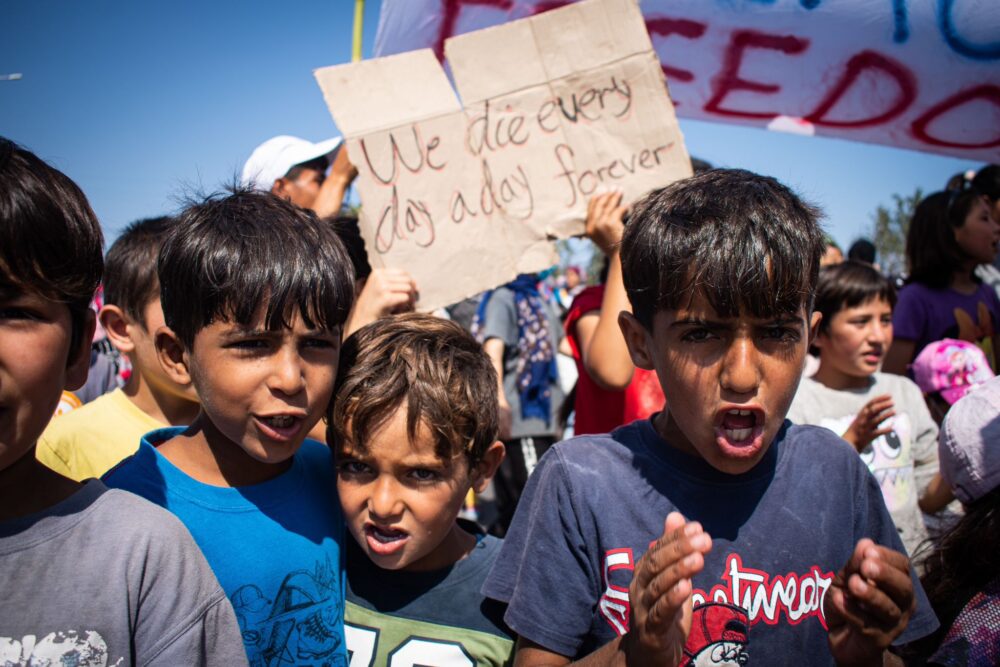
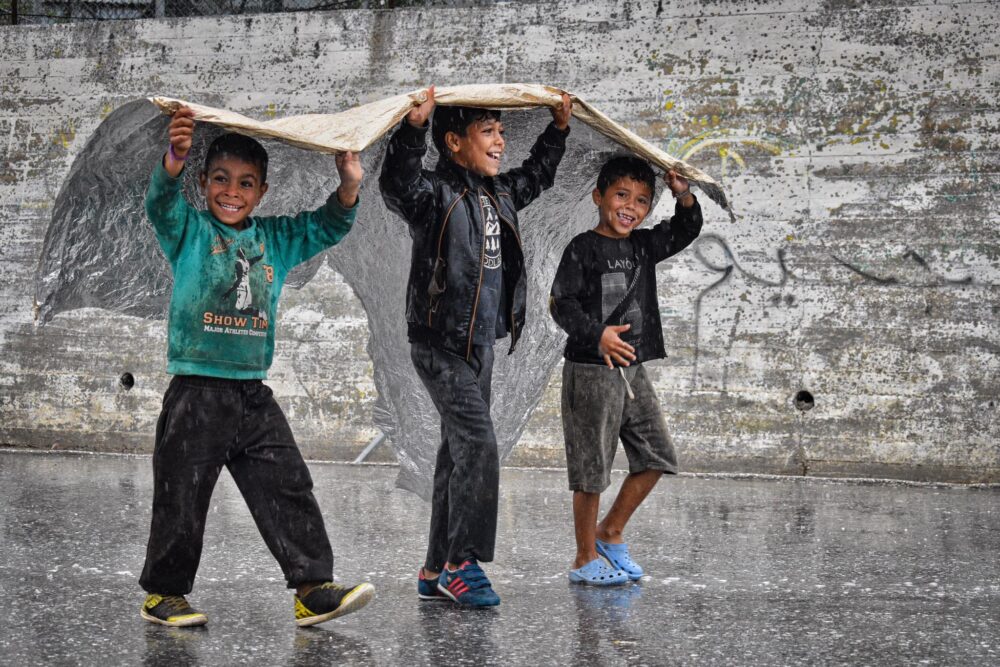
Now, he lives in Belfast, works as a photographer, and is slowly building a new life in Northern Ireland, a place he has called home for the past one and a half years. He was also recently accepted for a program in cybersecurity engineering at a university in Derry.
When I arrived one night of Ramadan to interview Alshewaili at his friend’s house, I was immediately greeted with food. His friend offered me dates, a sweet fruit from the Middle East, and grape juice while we waited for the main meal. We shared the meal with three of his friends, two from Yemen, and another from Iraq, whom he had met in Bangor, Northern Ireland, when he lived in a hotel hosting asylum seekers. They all cooked dinner together while chatting in Arabic, with Alshewaili translating the conversation for me.
When one of his friends offered me grape juice, I thanked him.
“We don’t say ‘thank you’ and ‘sorry’ in Arabic,” he told me. “Because everything you do, you expect to come back to you. If you do good, good comes.”
Upon arriving in Northern Ireland, Alshewaili felt welcomed. However, he also faced the restrictions of living in a hotel used to host asylum seekers, such as not being allowed to work while waiting for his documentation, being prohibited from cooking, being prevented from leaving the hotel on Fridays and receiving only £8.86 in weekly cash support — enough only for a one-way train trip to see his lawyer.
“It's just frustrating to seek asylum here because they don't allow you to work until you get your asylum. So you're basically living at the mercy of the government,” he said.
Constantly looking over his shoulder in Bangor, located a little less than an hour by train from Belfast, he lived in fear of potential attacks. The threat of violence loomed close, as many of his friends fell victim to street assaults in Bangor. Transitioning to Belfast offered a somewhat improved environment due to its larger size and more diverse population. However, even here, Alshewaili encountered troubling incidents. He recalls being followed while attending the gym, even to the changing rooms. One day, a staff member approached him, questioning his choice of footwear.
“At the end, she was like, ‘Look, if you don’t have trainers, we can donate. People donate them all the time for free,’” he said. “I was like. 'What do you mean? Why would you say that?' It’s racist. I came here to train, I pay for my membership. I have been a long-time member. So I don’t understand.”
“Peace walls” stand as stark reminders of the division between Catholic and Protestant neighborhoods in Northern Ireland. Some of these walls soar over 40 feet high, stretching approximately 21 miles (or 34 kilometers) in length. Initially erected during the Troubles to mitigate the risk of petrol bombs and missiles, these barriers are now more used for psychological security to both communities. To this day, many on the Protestant side identify strongly with the United Kingdom and British identity, while several members of the Catholic community align with Irish heritage.
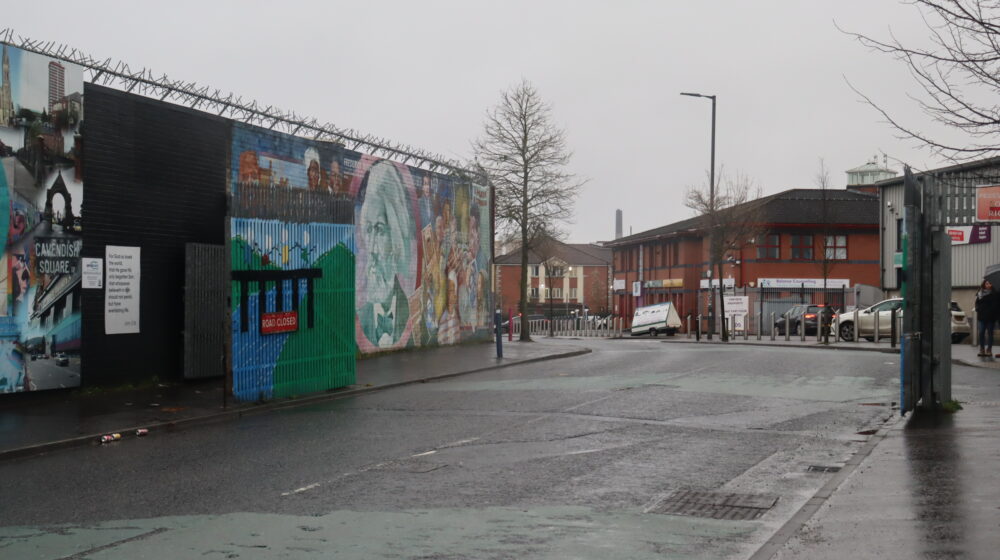
Upon his arrival, Alshewaili was initially optimistic, believing that the people of Northern Ireland would empathize with his refugee past. “I thought I shared a lot of things in common with these people. They will understand me because they went through it all, so they will understand why I am here,” he expressed. “But unfortunately, only one side of the wall understands; the other side has been racist. Not everyone, but a lot.”
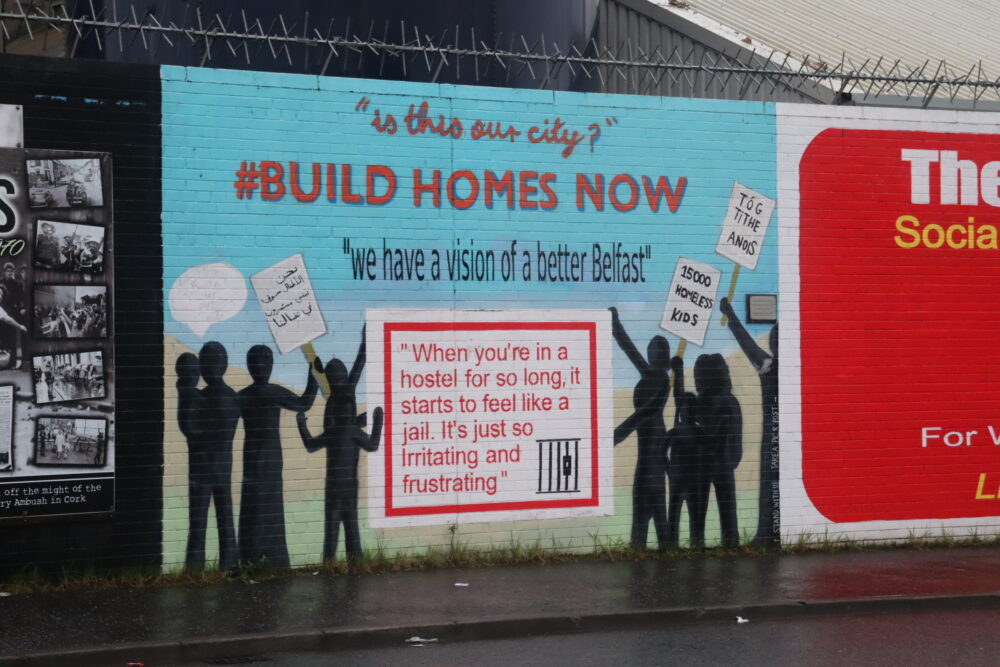
I asked Alshewaili to spend a day showing me Belfast from his perspective. As we navigated the city streets, the disparity between the communities became evident. While strolling through South and East Belfast, we observed strong loyalist sentiments depicted in murals.
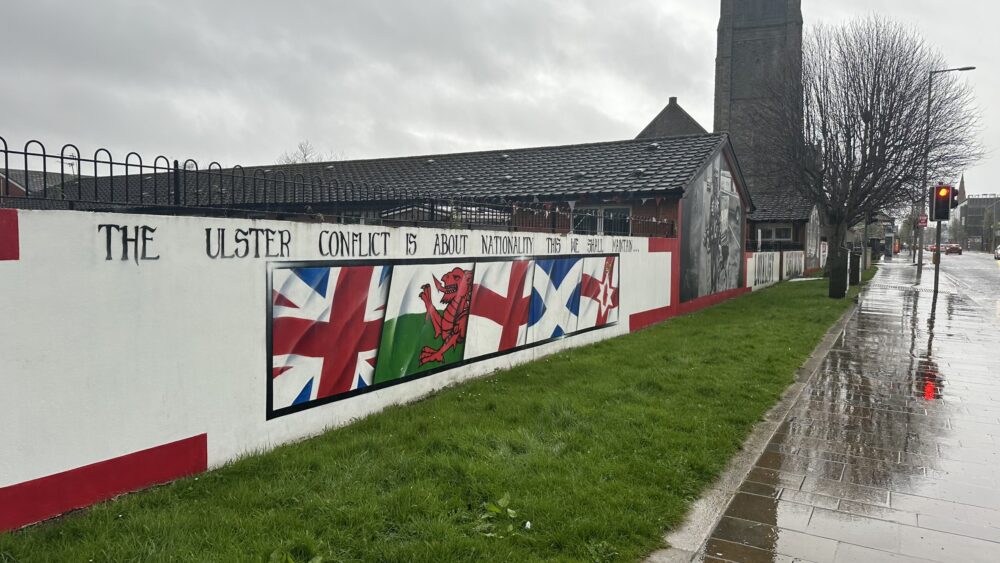
We also passed areas where Arab businesses were burned down in allegedly racially motivated incidents. However, upon turning onto Northumberland Street and passing through the gates that segregate Protestant and Catholic areas, we noticed a palpable shift in the atmosphere, with signs welcoming immigrants and an Irish sentiment.
“One side is way more welcoming, way more nice,” he said. “Those who cared for refugees, most of them were from the Irish side of the wall. They were trying to fix the situation and organize a protest against this system. They tried to support us in any possible way.”
In 2021, the Belfast Multi-Cultural Association (BMCA) building, situated in South Belfast, a mainly Protestant Loyalist area, was destroyed by arson. BMCA is an association that fosters cultural diversity and community services such as a food bank and prayer area. The crime was believed to be motivated by hate, according to police reports. Just hours after repairs were completed in 2022, the building suffered another arson attack, further reinforcing suspicions of a hate crime. Faced with ongoing safety concerns, the BMCA decided to relocate to a different site in February 2023. Naomi Green of the Belfast Islamic Centre explained that BMCA has moved to another building in a more mixed area which is considered safer, and where a previous mosque was located for over 40 years without problem.
“For the previous area, I wouldn't consider it a safe area for Muslims in particular, or people who may be 'coded' as Muslims — Arabs, South East Asians or African,” Green said. “No one was charged for most of the attacks in those areas.”
Despite these obstacles, Alshewaili acknowledged recent progress with advocacy for the creation of multicultural groups. "You know, it's getting better," he said. "Lots of people working on it and speaking on it."
During his time in Bangor, Alshewaili believes he experienced his worst period yet. The region witnessed a surge of protests against immigrants residing in hotels, with demonstrators accusing them of various crimes and expressing discontent over government expenditure.
“Some people held different kinds of signs,” he said. “Signs accusing us of rape, theft, blaming the government for spending millions on us and labeling us as criminals, among other accusations.”
One notable example is the Facebook group "North Down Concerned Residents," which attracted about 2,500 followers and serves as a platform for local opposition against refugees and asylum seekers. The group organizes protests outside hotels and voices grievances regarding the immigrant population in Northern Ireland.
Alshewaili perceived a deliberate attempt by the government to scapegoat refugees for economic woes. With private hotels housing immigrants paid for by the government, a large part of the Northern Ireland population is unsatisfied with the arrangement.
“The government is using refugees as scapegoats, telling them that the economy is bad because of refugees,” he said. “The asylum system in the UK is for profit. So they are profiting from me.”
A prior BBC investigation revealed that private companies are experiencing growing profits while the government spends millions of pounds daily to accommodate asylum seekers in the UK.
“Reducing the backlog in asylum cases and establishing a more efficient and robust decision-making system is not a strategy in and of itself to stop illegal migration but is important to taxpayer value and we have prioritised it,” said Minister for Immigration, Robert Jenrick, in a statement to the House of Commons on illegal migration.
There exists a suspicion that paramilitary groups may be orchestrating attacks against immigrants in Bangor. On one occasion, Alshewaili said the police had video footage of an incident but still did not get involved.
“We made two complaints about racism and racist attacks,” Alshewaili said. “They closed the investigation after two days only and told my friend that they could not identify the people. It is Bangor, it is not big. The police cannot act against the paramilitary.”
Alshewaili maintains that many of the tensions between the two communities could be alleviated through improved housing policies. “I would put more housing in Belfast for both communities,” he asserted. “Let everyone live with dignity.”
Amid Rising Islamophobia in Ireland, Leading Imam Takes to the Polls
DUBLIN — Nestled behind a South Asian restaurant, a hookah lounge and a tire repair shop is home to one of Ireland’s preeminent mosques: The Al-Mustafa Islamic Center. In March, on the first Jummah (Friday worship day) of Ramadan, hundreds of Muslim worshippers filed into the mosque, swapping their shoes for flip flops as they performed ablutions to purify themselves before prayers. Men whispered in Urdu, Arabic and English as they packed into the prayer hall, sitting in lines on the ground to listen to Sheikh Umar al-Qadri’s Khutbah, or weekly sermon.
Al-Qadri, the leader of the congregation, spoke of the importance of Ramadan as a gift and a pathway to the gates of paradise. However, he then posed a question that strayed away from the usual theological sermon.
“How many of you have registered to vote?” he asked.
In the packed prayer hall, only a handful of worshippers raised their hands.
It was an unusual but not unexpected turn. Just about everyone in the congregation knew that, just a few weeks earlier, al-Qadri had been the victim of a violent attack. But rather than dwell on his suffering, he reached for a solution.
“It is very important we participate in the elections in June. Right now there are some people that are spreading Islamophobia,” he said. “It is time we represent ourselves in public office. If you don’t register, it means you have no voice.”
Anti-immigrant sentiment persisted in Ireland this year. In November, hundreds of Irish rioted after an Algerian immigrant wielding a knife injured a woman and three young children in Dublin. Anti-migrant protests followed, becoming violent as demonstrators attacked public transport, looted private businesses, and ambushed police vehicles. On February 15th, al-Qadri was assaulted in what he said was a Muslim-hatred fueled attack.
On the day of the attack, al-Qadri said he received a call from a man who said he was looking for a sheikh to officiate a marriage. However, when Dr. al-Qadri arrived, he became suspicious when he didn’t see any cars outside the house that would be expected for a big occasion. When al-Qadri called the man, he told him to drive to the end of the block. There, al-Qadri stepped out of the car and greeted two men. Moments later he blacked out and woke up in the driver's seat of his car, with injuries to his jaw and a chipped tooth.
“I was confused,” al Qadri said. “I looked at my hand, my watch was still there. My phone was there. So then I realized it’s not a robbery, I was just attacked for who I am.”
Irish authorities continue to investigate the incident.
The sheikh is a prominent Sunni Pakistani cleric who moved to Ireland from the Netherlands in 2003. He first came to work as a content specialist in Ebay’s legal department, but soon Muslim immigrants turned to him to set up a mosque because of his past expertise in Islamic studies. Over time the modest mosque became a full Islamic center, with over 500 members.
Upon entering the Islamic Centre, the former commercial warehouse was clearly not built to house one of Ireland’s largest Muslim congregations. At the entrance, there is a narrow corridor, where worshippers cram through to enter the main hall. The main hall is spacious but relatively empty: a portable white qiblah, the structure that designates the direction of Mecca, stands in the front of the room. Most walls are empty, but one holds a bookcase with dozens of Quarans.
When I asked al-Qadri about relations between Muslim and Irish communities, his face brightened. “It’s tremendous.” He spoke of different bridge-building initiatives between Ireland’s faith communities. He holds an annual Iftar celebration to mark the end of the fast on nights of Ramadan that is attended by prominent Irish religious leaders, including the Catholic Archbishop and an Orthodox Rabbi. After the attack, Al-Qadri said countless Irish citizens reached out to him extending their prayers.
However, al-Qadri said that there has been a noticeable rise in anti-migrant rhetoric over the past couple years, especially reflected on X, the social media site formerly known as Twitter. Following the attack, dozens of Irish X users claimed the entire event was a hoax. Some users vilified his Muslim identity, saying he should go back to where he came from and mocking his traditional thobe.
Al-Qadri, 41, stands out from other middle-aged Irish citizens. He has a well-kept dark beard, glasses, and sports a traditional black thobe. While he may stand out, he speaks with a light Irish accent, signaling that he has been in Ireland for some time.
Some X users denied the attack happened. One prominent anti-migrant user, Irish Git, posted a video claiming the Sheikh’s account was fabricated.
“People started finding holes and inconsistencies in (al-Qadri’s) fairy tale,” he said. “The gig is up, it’s game over. I wonder when the next audition is.”
The video gained nearly 8 thousand views.
Dr. Eugenia Siapera, co-director for the University College of Dublin’s Centre for Digital Policy, said xenophobic rhetoric in Irish social media circles accelerated since the pandemic. She said that anti-migrant messaging was also exacerbated by Elon Musk’s acquisition of Twitter, and his purge of its trust and safety team. While she said the majority of Irish do not harbor far-right views, Siapera said this group is having an increasing impact on the national debate.
“The fact that they're vocal means that they're influencing policy, even if their views do not reflect the wider public opinion,” she said. “I think it's going to get worse before it gets any better.”
Al-Qadri reiterated Dr. Siapera’s concerns. While he said that he believed Twitter previously had a troubling left-wing bias, its shift to the right presents a new danger to Ireland’s Muslim community.
“What has happened since Elon Musk took over, he has given a free hand to anyone to spread hatred,” he said. “That has led to the rise of anti Muslim sentiments in Ireland.”
In response to public criticism, X released a statement this past September reaffirming their commitment to combating prejudice. X said that it expanded its policies around hateful and violent speech.
“We are committed to combating hatred – particularly when they are directed at persecuted groups,” the statement said.
Dr. James Carr, a sociologist at the University of Limerick, said the “replacement theory,” a conspiracy that claims liberal elites are looking to replace domestic citizens with immigrants, influences far-right rhetoric targeting Ireland’s Muslims.
“The Irish context is not unusual,” Carr said. “It’s the same experience we see internationally.”
Carr noted that after the attack on al-Qadri, dozens of tweets circulated showing a sticker purporting to be an advertisement for the Islamic Centre calling for the implementation of Islamic “Sharia” law in Ireland. While the stickers were a hoax, the Journal said posts showing the sticker had been viewed over 100,000 times.
Increasing Muslim voter participation has been an issue for al-Qadri even before the February attack. He has encouraged the candidacy of Asad Ali, a 36-year-old immigrant from Pakistan who will be running for office in the village of Ongar, just outside of Dublin. Mr. Ali, who will be running with the conservative Irish party Fianna Fail, is looking to become the first Muslim on the Village Council. He has attended the Islamic Center for the past five years.
“I’ve been here a long time, we never had to face such issues: the attack on al-Qadri and the riots in the city center,” he said. “I’m a very proud Irish. We just need to build bridges, the vast majority of people in this country are very welcoming.”
Others in al-Qadri’s congregation reiterated that Ireland has been a welcoming place. Faisal Afridi, a computer science student at Dublin City University, immigrated to Ireland with his family from Pakistan. Always feeling welcomed by the native Irish in his community, Afridi said he was shocked by the riots that broke out in November.
“I actually never expected anything like that to happen that night,” he said. “It just happened out of nowhere.”
Carr said that it has been difficult to measure Islamaphobic hate crimes because Irish authorities do not have the most accurate data. He said many hate crimes are recorded as standard criminal offenses. However, Carr added that new hate crime legislation could be passed this year that will address this issue.
“It’s been a long time coming,” he said. “One incident is one too many.”
Despite recent events, al-Qadri remains optimistic about the future prospects for Muslims in Ireland. He even wants to meet his attackers, and ask them what led them to commit this act.
“We're human beings,” he said. “We're normal human beings like everybody else.”
After al-Qadri finished the Khutbah, he took his place towards the front of the prayer hall, standing with his fellow worshippers as they prepared for prayers. They recited the Fatiha, the first verse of the Quran recited before prayers. The men looked down in reflection, interlocking their arms across their chests. Finally they fell to the ground facing the qiblah, whispering praises of God. While legitimate concerns remained, Ireland’s Muslim community remained steadfast in their faith.

